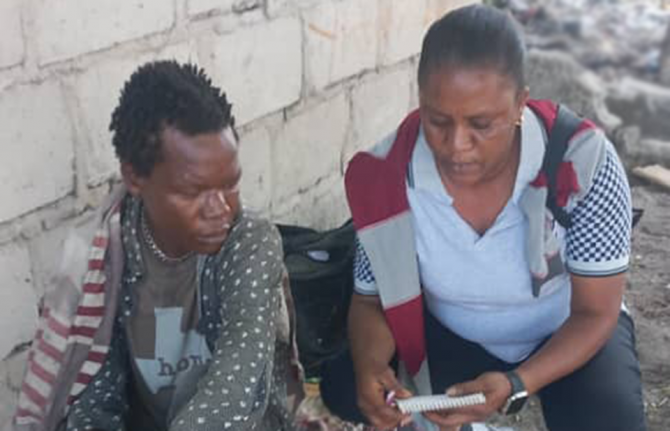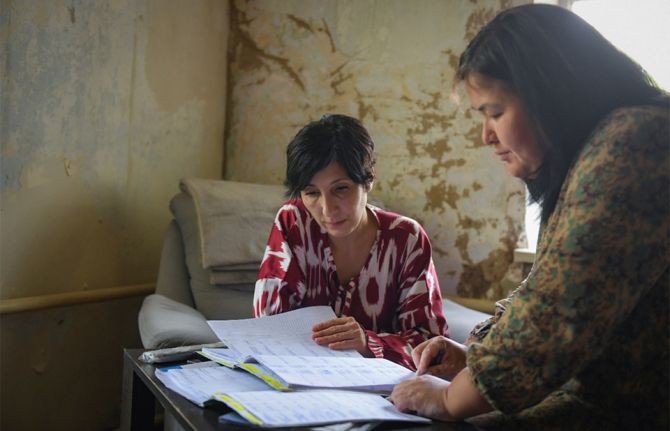
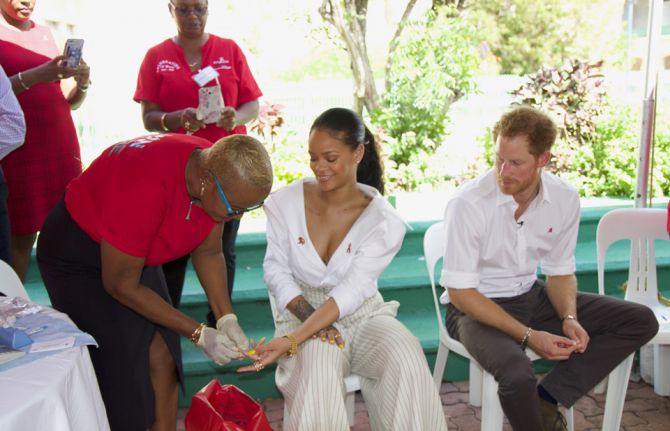
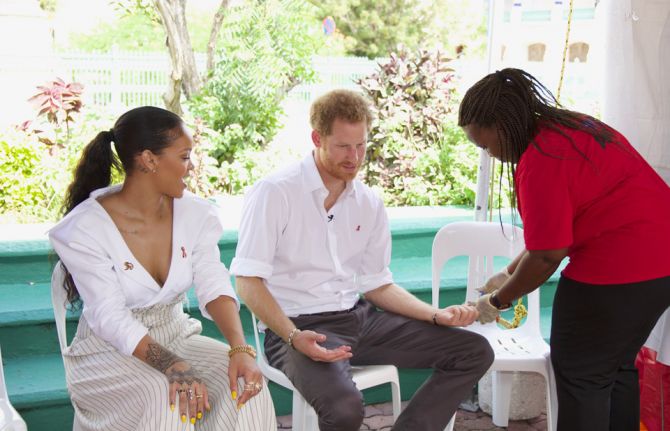
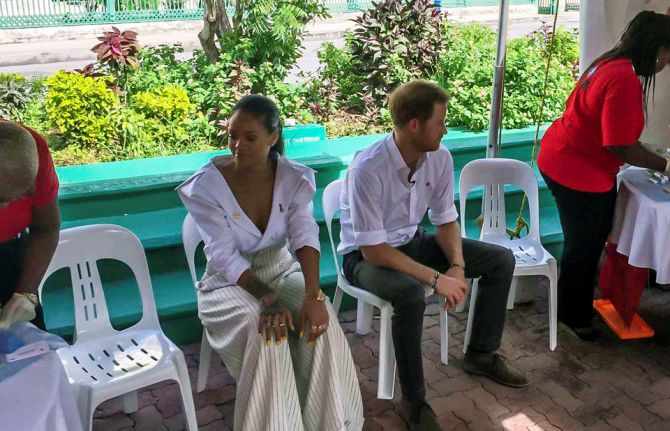
Update
Barbados World AIDS Day Man Aware campaign raises HIV awareness among men
07 December 2016
07 December 2016 07 December 2016On World AIDS Day, Prince Harry and Rihanna showed the people of Barbados and the world how simple it is to learn your HIV status.
“That was not bad,” Rihanna said as Prince Harry looked on from the bench next to her in Heroes Square, Bridgetown.
“It’s a pin prick,” he agreed.
Prince Harry and Rihanna were at the Man Aware event hosted by the Barbados National HIV/AIDS Commission. Here, the message that HIV testing is quick and easy is important for everyone, including boys and men—in Barbados, more than 85% of AIDS-related deaths are among men.
“Men are involved in high levels of risk-taking and present late for testing and treatment,” explained Jacqueline Wiltshire Gay, Director of the Barbados National HIV/AIDS Commission.
Barbados is one of the countries in the Caribbean closest to achieving control of its HIV epidemic and is currently being validated by the Pan American Health Organization for eliminating mother-to-child transmission of HIV. Barbados is also on track to achieving the 90–90–90 targets of 90% of people living with HIV knowing their HIV status, 90% of people who know their HIV-positive status accessing treatment and 90% of people on treatment having suppressed viral loads. To reach the Fast-Track Targets, the country will have to change behaviours among men, who are less likely to get tested early and too often seek medical assistance too late.
Barbados is not alone. In several Caribbean countries, including Antigua and Barbuda, Guyana and Saint Lucia, the HIV epidemic is male dominated. In Trinidad and Tobago, while more females than males are getting tested for HIV, more males are testing HIV-positive. In Belize, according to UNAIDS estimates, more than half (57%) of AIDS-related deaths in 2015 were among males.
But men often don’t think of themselves as being at risk. Although in many countries in the region there are concentrated HIV epidemics among key populations, transmission rates among the general population are also relatively high.
The Barbados World AIDS Day campaign focused on specific strategies to engage, educate and empower men. According to Ms Wiltshire Gay, there is a renewed emphasis on collaborating with civil society organizations to ensure that men are reached.
At the World AIDS Day event, HIV counsellor Fabian Sargeant told Prince Harry and Rihanna that barber shops are excellent places to raise awareness of the need for HIV testing, because men meet there to discuss various aspects of their lives, including sex and relationships. Prince Harry said that while young people want to talk about HIV, there is still a stigma associated with it in the Caribbean. He thinks that if people knew about the advances in testing and treatment, they would be more willing to come forward.
“If you are HIV-positive you can take medication for the rest of your life and have a completely normal life,” he said.
Rihanna agreed, “So many people don’t know how easy it is to get tested and how quick you get your results back and how discreet it could be. Even if you are positive, there’s so much that can be done and the sooner the better.”
Region/country


Feature Story
Hands up for #HIVprevention mobilizes support worldwide
05 December 2016
05 December 2016 05 December 2016It started in October with a single message written on one person’s hand: “know your status”. Nine weeks on and thousands of people from all over the world have demonstrated their support for UNAIDS’ “Hands up for #HIVprevention” campaign by sharing photos and videos expressing what HIV prevention means to them. Through a range of content, the campaign highlighted different aspects of HIV prevention week by week and showed how they relate to different groups of people, including adolescent girls and young women, key populations and people living with HIV.
The campaign reached more than 2 million people on Facebook and 64 000 people have engaged through likes, shares and comments. On Twitter, the campaign reached almost 3 million people and UNAIDS campaign tweets were retweeted 12 000 times and liked 9500 times.
Messages that people wrote on their hands and held up for the world to see as part of the campaign include “Use condoms always”, “Provide support”, “End stigma”, “Invest”, “PrEP”, “No violence” and “Gender equality.”
Prominent contributors included the First Lady of Benin, Claudine Talon, the First Lady of China, Peng Liyuan, the First Lady of Guinea-Bissau, Hadja Djene Kaba Condé, the First Lady of Panama, Lorena Castillo de Varella, and Tobeka Madiba Zuma, First Lady of South Africa.
UNAIDS International Goodwill Ambassador Michael Ballack also supported the campaign, with a message in support of zero discrimination. He was joined by James Chau, UNAIDS Goodwill Ambassador for China, Vera Brezhneva, UNAIDS Goodwill Ambassador for Eastern Europe and Central Asia, and Alejandra Oraa, UNAIDS Regional Goodwill Ambassador for Latin America and the Caribbean. The young television star Jenna Ortega provided a powerful and personal message about why HIV prevention was important to her. Princess Tessy of Luxembourg, UNAIDS Global Advocate for Young Women and Adolescent Girls, joined the campaign in the week highlighting women’s empowerment.
UNAIDS partners such as the United Nations Educational, Scientific and Cultural Organization, the United Nations Office on Drugs and Crime, the Global Fund to Fight AIDS, Tuberculosis and Malaria, the President’s Emergency Fund for AIDS relief and mothers2mothers also joined in, offering powerful content and testimonies from people all over the world that showed how innovative programmes are reaching the people most in need of HIV prevention methods.
The campaign followed the launch of the UNAIDS Prevention gap report earlier this year, which showed that an estimated 1.9 million adults have become infected with HIV every year for the past five years and that the number of new HIV infections is rising in some regions. The report shows that HIV prevention efforts must be reinvigorated if the world is to stay on the Fast-Track to ending the AIDS epidemic by 2030.
The campaign culminated in a call for increased investment in HIV prevention strategies targeted at the people and places most in need of them. The commitment made in the 2016 Political Declaration on Ending AIDS is to ensure that financial resources for HIV prevention are adequate and constitute no less than a quarter of AIDS spending globally.
The World AIDS Day Facebook page remains open for new contributions. UNAIDS thanks everyone who has already participated.
Get the message out: AIDS is not over, but it can be.
Hands up for #HIVprevention — World AIDS Day campaign

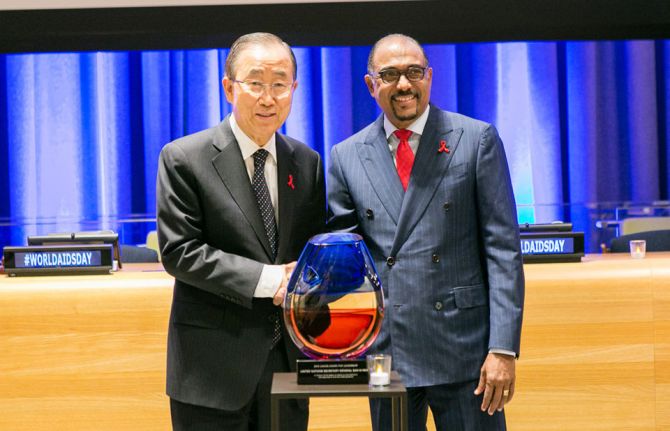
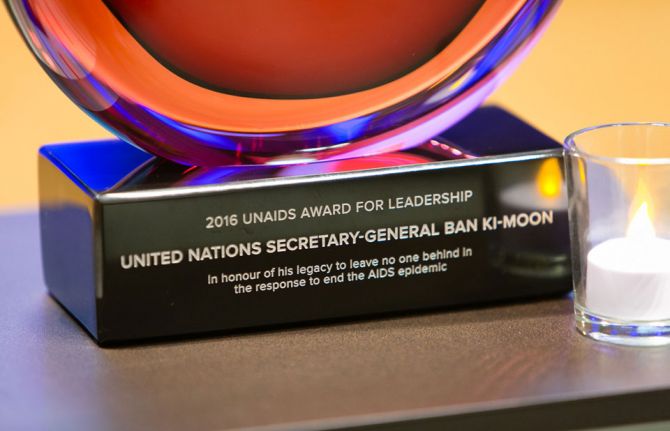
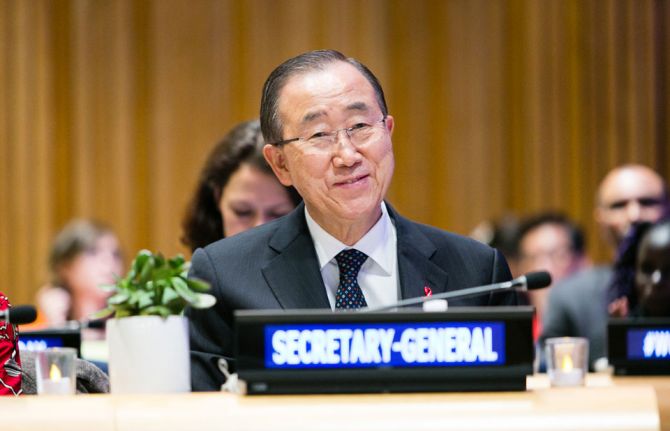
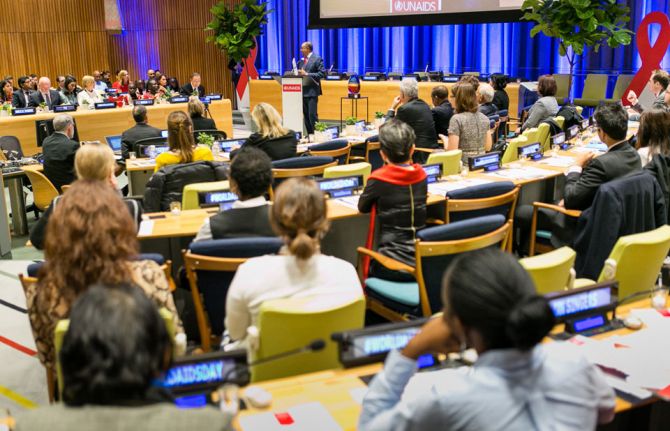
Press Release
UNAIDS presents UN Secretary-General Ban Ki-moon with leadership award for his commitment to the response to HIV
30 November 2016 30 November 2016UNAIDS recognizes Mr Ban for his outstanding efforts to ensure access to HIV services for all and for speaking out for the most marginalized in society.
NEW YORK/GENEVA, 30 November 2016—UNAIDS has honoured the United Nations Secretary-General, Ban Ki-moon, for his unfaltering commitment to ending the AIDS epidemic and for acting as a voice for the voiceless to ensure access to HIV services for the key populations most affected by HIV.
Under the leadership of the Secretary-General, the world reached the AIDS targets of Millennium Development Goal 6 and moved to end the AIDS epidemic by 2030 as part of the Sustainable Development Goals. Exceptional progress has also been made towards a shared vision of zero new HIV infections, zero discrimination and zero AIDS-related deaths.
“Together, we have worked for a world where more people than ever are on treatment. Half as many children are infected through mother-to-child transmission. And double the number of people have access to medicines. I am calling for action to get on the Fast-Track to our target of 30 million people on treatment by 2020,” said Mr Ban.
Mr Ban has consistently spoken out on behalf of gay men and other men who have sex with men, sex workers, people who inject drugs, prisoners and transgender people in order to ensure that they have access to life-saving HIV prevention and treatment services. He has been a longstanding supporter of an evidence-informed approach to the epidemic that puts people’s needs at the centre of the response to HIV.
“We are motivated to fight AIDS because we know that every child deserves care, every person deserves treatment and all vulnerable groups deserve protection from stigma and abuse,” said Mr Ban. “Tolerance and awareness help stop AIDS. Speaking out protects life.”
Mr Ban was presented with the Award for Leadership by the Executive Director of UNAIDS, Michel Sidibé, at a special World AIDS Day event held in his honour at the United Nations Headquarters in New York, United States of America, on the eve of World AIDS Day 2016.
“The progress the world has made in reducing the impact of HIV and expanding access to health for millions of people would not have been possible without the determined leadership of my friend, Ban Ki-moon,” said Mr Sidibé. “He has been consistent in his support for the most vulnerable in the world and remains a staunch human rights defender for the people most affected by the epidemic. His sense of service, commitment and compassion will continue to be a source of inspiration.”
Mr Ban has strongly supported the ambitious targets set by UNAIDS and its partners. In 2011, he participated in the launch of the Global Plan towards the elimination of new HIV infections among children by 2015 and keeping their mothers alive, which prioritized more than 20 countries that, in 2009, accounted for 90% of the global number of pregnant women living with HIV who were in need of services to prevent mother-to-child transmission. New HIV infections among children in the 21 countries most affected by the epidemic in sub-Saharan Africa decreased from 270 000 [230 000–330 000] in 2009 to 110 000 [78 000–150 000] in 2015. AIDS-related deaths among children in the priority countries fell by 53% in those six years as their access to treatment tripled.
In July 2015, Mr Ban participated in an event in the Ethiopian capital, Addis Ababa, to mark the achievement of the Millennium Development Goal 6 target of 15 million people gaining access to life-saving antiretroviral medicines. The “15 by 15” target set in 2011 and championed by Mr Ban was achieved several months ahead of schedule. Access to antiretroviral treatment continues to expand, to 18.2 million [16.1 million–19.0 million] people as of June 2016. Treatment access has grown six fold since Mr Ban took up office in 2007.
His bold and visionary leadership will continue to inspire the world to end the AIDS epidemic by 2030 within the framework of the Sustainable Development Goals.
UNAIDS LEADERSHIP AWARD
The UNAIDS Award for Leadership recognizes a person or an organization that has made a major and lasting contribution to restoring dignity and improving people’s lives. UNAIDS recognizes the key role leadership plays in creating an environment for positive social change and accelerating progress in the AIDS response and beyond.
The physical award was created by celebrated artist Jamie Harris and is made of infused glass. It has a blue orb to represent the United Nations delivering as one and a red flame to embody the global solidarity to end the AIDS epidemic.
UNAIDS
The Joint United Nations Programme on HIV/AIDS (UNAIDS) leads and inspires the world to achieve its shared vision of zero new HIV infections, zero discrimination and zero AIDS-related deaths. UNAIDS unites the efforts of 11 UN organizations—UNHCR, UNICEF, WFP, UNDP, UNFPA, UNODC, UN Women, ILO, UNESCO, WHO and the World Bank—and works closely with global and national partners towards ending the AIDS epidemic by 2030 as part of the Sustainable Development Goals. Learn more at unaids.org and connect with us on Facebook, Twitter, Instagram and YouTube.
Contact
UNAIDS New YorkSophie Barton-Knott
tel. +41 79 514 6896
bartonknotts@unaids.org
UNAIDS Geneva
Alasdair Reid
tel. +41 79 594 1923
reida@unaids.org
Press centre
Download the printable version (PDF)

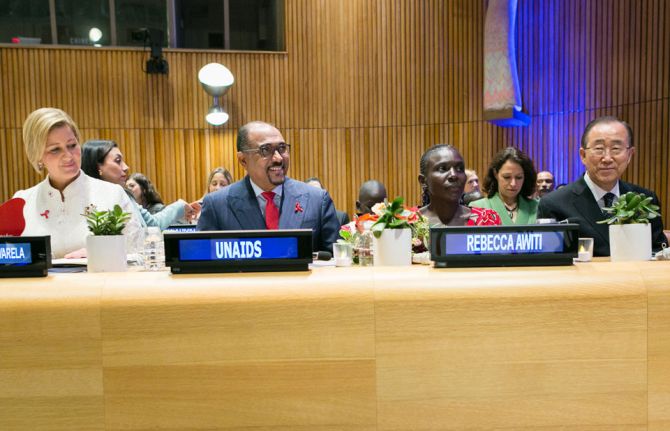
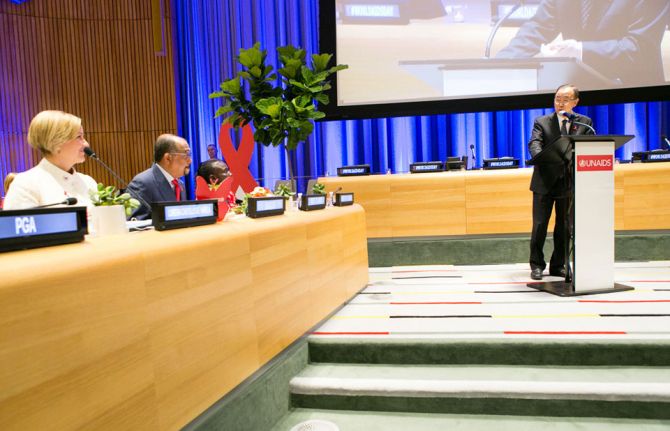
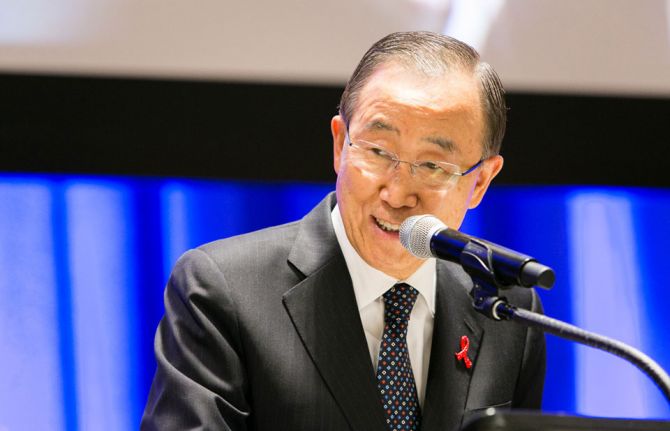

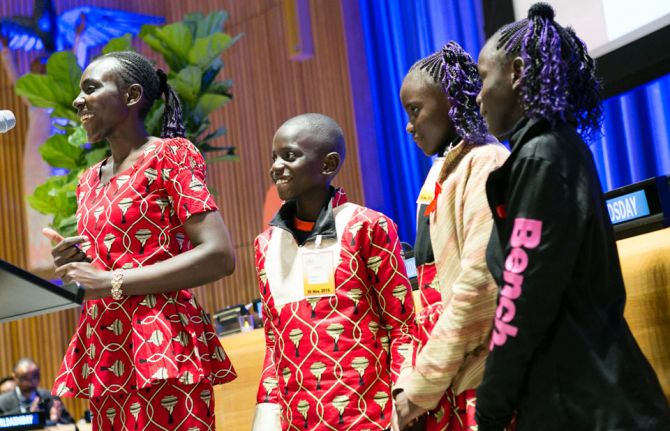

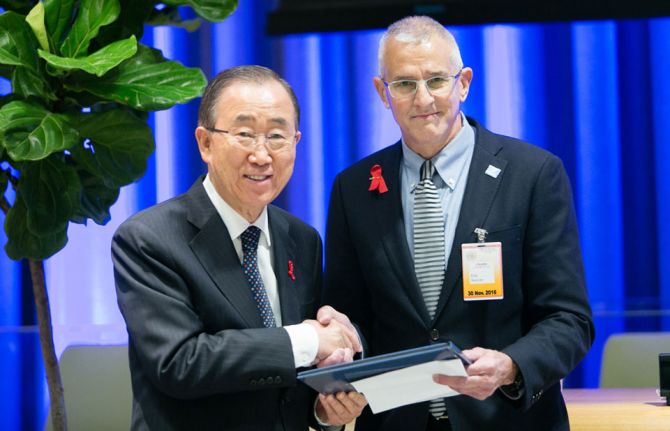
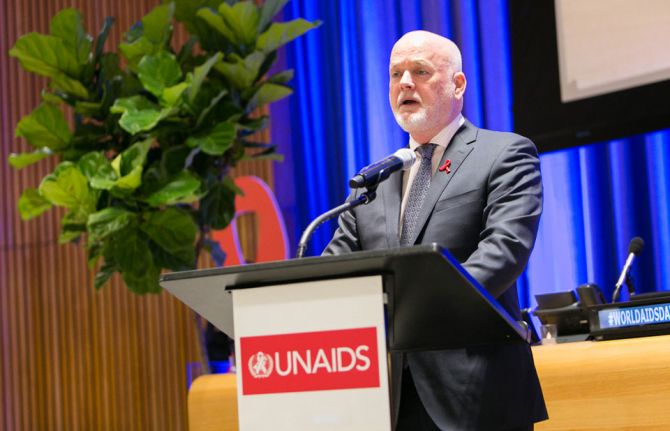
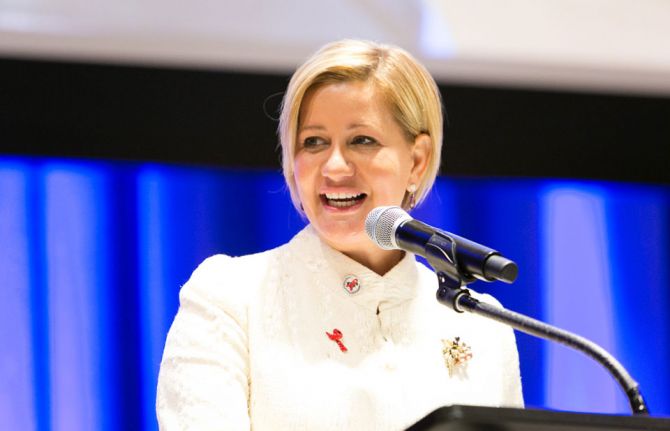

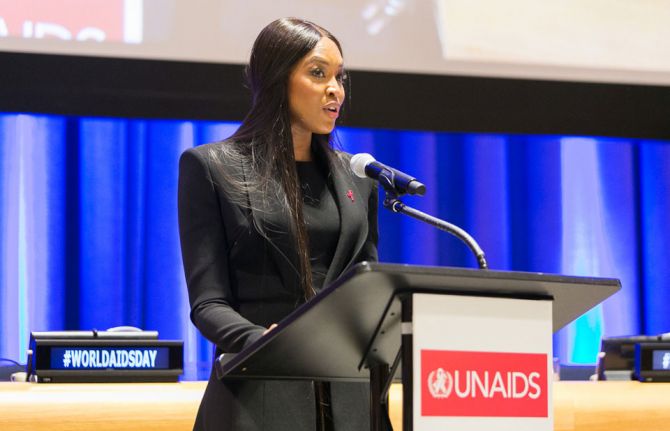
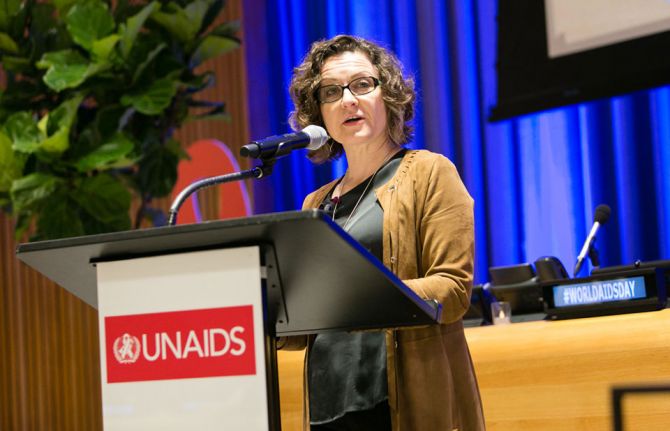

Press Release
UNAIDS hosts World AIDS Day event and honours the UN Secretary-General for his remarkable contributions to the AIDS response
30 November 2016 30 November 2016Speakers urge partners to move forward together to end the AIDS epidemic by 2030 as part of the Sustainable Development Goals
GENEVA/NEW YORK, 30 November 2016—On the eve of World AIDS Day, UNAIDS has hosted a special event at the United Nations Headquarters in New York, United States of America, to commemorate World AIDS Day. The event, Moving Forward Together: Leaving No One Behind, was also held to honour the leadership of the United Nations Secretary-General, Ban Ki-moon, and his remarkable contribution to the response to HIV in advance of his handover to the new Secretary-General, António Guterres, at the beginning of 2017.
Following a moment’s silence to remember the 35 million people who have lost their lives to AIDS, Michel Sidibé, Executive Director of UNAIDS, presented Mr Ban with the UNAIDS Award for Leadership for speaking out on behalf of, and his commitment to, the people most affected by HIV.
Accepting the award, Mr Ban said that he was proud to be an activist for the rights of lesbian, gay, bisexual, transgender and intersex people and spoke of his motivation. “We are motivated to fight AIDS because we know that every child deserves care, every person deserves treatment and all vulnerable groups deserve protection from stigma and abuse. Tolerance and awareness help stop AIDS. Speaking out protects life,” he said.
Mr Sidibé paid tribute to the Secretary-General and the exceptional achievements made in the AIDS response during his tenure. “Secretary-General Ban Ki-moon, you have been a true champion for people living with HIV. When you arrived only three million people were on HIV treatment. Our World AIDS Day report shows that more than 18 million are now on treatment. This isn’t just about numbers, but the very lives of people. You have shown through these years that people’s dignity is central to your agenda,” he said.
Since Mr Ban assumed office as United Nations Secretary-General in January 2007, the number of people living with HIV accessing life-saving antiretroviral therapy has increased from 2.9 million at the end of 2006, to 18.2 million [16.1 million–19.0 million] in June 2016. The number of people who died from AIDS-related illnesses has halved, from 2 million in 2006 to 1.1 million in 2015, and the number of new HIV infections among children has been reduced by two thirds, from 430 000 in 2006 to 150 000 in 2015.
During the event, Mr Ban was reacquainted with Rebecca Awiti, a woman living with HIV who met the Secretary-General in 2011 during an official visit to Kenya, where he launched The Global Plan towards the elimination of new HIV infections among children and keeping their mothers alive. Ms Awiti is the mother of triplets, born free from HIV thanks to antiretroviral medicines. “You brought hope to me, my children and my children’s children that an AIDS-free generation is possible in our lifetime,” she said.
One of the founders of the global HIV treatment access movement, Eric Sawyer, praised the Secretary-General for his commitment to zero discrimination. “Mr Secretary-General, I thank you as a long-term survivor of HIV and as a long-time member of UN Plus and UN Cares, and a member of the Free and Equal campaign, for your leadership, for your compassion and for your commitment to the AIDS response, and for your commitment to equality and human rights for all,” he said.
As a special guest at the event, the First Lady of Panama, Lorena Castillo de Varela, who is also UNAIDS Special Ambassador for AIDS in Latin America, stressed the importance of breaking down the stigma still surrounding HIV and standing firm on zero discrimination. “We must all carry the torch for the Secretary-General and, as leaders, fight discrimination every day of our lives,” she said. “We must celebrate the diversity that unites us, and promote solidarity, respect, inclusion and peace.”
Kenneth Cole, amfAR Chair and a leading fashion designer, warned of a growing population that is disengaged and desensitized to the virus and said it was a critical time to coordinate and Fast-Track the effort to end AIDS. “We can contain and reverse the AIDS epidemic through a coordinated response. I strongly believe we can and must and will make AIDS history,” he said.
The President of the United Nations General Assembly, Peter Thomson, called on the world to do more and reach the clear time-bound targets set by Member States in the 2016 Political Declaration on Ending AIDS. “On this World AIDS Day, we honour those who have passed away by committing to end the AIDS epidemic, achieve the Sustainable Development Goals and build a healthy, safe, peaceful and sustainable future for us all,” he said.
Model, actress and philanthropist Naomi Campbell spoke of the triple threat facing young women and girls of not knowing their HIV status, not accessing life-saving treatment and not being empowered to protect themselves from HIV. “Today, I stand in solidarity with the millions of young women and adolescent girls growing up in a world where they are at risk of HIV,” she said. “I want to make a difference—you can count on me to do what I can to help end AIDS.”
Deputy Executive Director of the United Nations Population Fund, Laura Londén, underscored the importance of working as one to Fast-Track the response to HIV. “We can only reach the goal of ending the AIDS epidemic by 2030 if we are serious about HIV prevention. We need to end the isolation and fear that key populations face every day,” she said.
The event culminated with an inspirational and uplifting performance by the United Nations Choir, which performed Mae, a Japanese song about moving forward.
|
Global summary of the AIDS epidemic in 2015/2016* |
||
|
Number of people living with HIV
|
Total |
36.7 million [34.0 million–39.8 million] |
|
Adults |
34.9 million [32.4 million–37.9 million] |
|
|
Women |
17.8 million [16.4 million–19.4 million] |
|
|
Children (<15 years) |
1.8 million [1.5 million–2.0 million] |
|
|
Number of people newly infected with HIV |
Total |
2.1 million [1.8 million–2.4 million] |
|
Adults |
1.9 million [1.7 million–2.2 million] |
|
|
Children (<15 years) |
150 000 [110 000–190 000] |
|
|
AIDS-related deaths |
Total |
1.1 million [940 000–1.3 million] |
|
Adults |
1.0 million [840 000–1.2 million] |
|
|
Children (<15 years) |
110 000 [84 000–130 000] |
|
|
Number of people on HIV treatment |
Total |
*18.2 million [16.1 million–19.0 million], June 2016 |
UNAIDS
The Joint United Nations Programme on HIV/AIDS (UNAIDS) leads and inspires the world to achieve its shared vision of zero new HIV infections, zero discrimination and zero AIDS-related deaths. UNAIDS unites the efforts of 11 UN organizations—UNHCR, UNICEF, WFP, UNDP, UNFPA, UNODC, UN Women, ILO, UNESCO, WHO and the World Bank—and works closely with global and national partners towards ending the AIDS epidemic by 2030 as part of the Sustainable Development Goals. Learn more at unaids.org and connect with us on Facebook, Twitter, Instagram and YouTube.
Contact
UNAIDS New YorkSophie Barton-Knott
tel. +41 79 514 6896
bartonknotts@unaids.org
UNAIDS Geneva
Alasdair Reid
tel. +41 79 594 1923
reida@unaids.org
Press centre
Download the printable version (PDF)

Update
World AIDS Day 2016: HIV prevention for young people in Kenya
02 December 2016
02 December 2016 02 December 2016This year’s World AIDS Day commemorations in Kenya—led by the First Lady of Kenya, Margaret Kenyatta, at the Nyayo National Stadium in Nairobi—were dedicated to young people, under the theme “Engage, prevent, celebrate”.
Thousands of young people joined the First Lady to celebrate the end of a presidential campaign to end HIV stigma, especially among adolescents and young people. The nationwide Kick out HIV Stigma campaign leveraged the power of football to mobilize young people to access stigma-free HIV counselling and testing services and HIV messages.
Ms Kenyatta was joined at the event by UNAIDS Deputy Executive Director Luiz Loures. Ms Kenyatta presented trophies to the best performing girls’ and boys’ football teams and county governments that recorded exemplary performance in providing HIV testing and HIV messages to young people. The event also included a concert that engaged Kenyan popular artists to mobilize young people to test for HIV.
HIV is a significant health threat among young people in Kenya. In 2015, 36 000 new HIV infections and 3900 AIDS-related deaths occurred among young people aged 15–24 years. HIV-related stigma remains a significant barrier to many young people accessing HIV counselling, testing and life-saving treatment.
In seven months, the Kick out HIV Stigma campaign reached an estimated 15 million people with HIV messages and provided one-to-one mentorship to more than 3.8 million people and HIV counselling and testing to more than 800 000 people while linking people who tested HIV-positive to treatment.
Quotes
“HIV HAS MADE AN ENEMY OF ALL OF US AND IT IS ONLY WHEN ALL OF US COME TOGETHER THAT WE HAVE ANY HOPE OF FINALLY GETTING TO ZERO—ZERO NEW HIV INFECTIONS, ZERO AIDS-RELATED DEATHS AND AN HIV STIGMA-FREE GENERATION.”
“KENYA IS SETTING THE PACE IN HIV PREVENTION AND KICKING OUT HIV-RELATED STIGMA TO ENSURE AN AIDS-FREE GENERATION.”
“I AM HOPEFUL THAT ALL YOUNG PEOPLE ACROSS THE COUNTRY WILL BE ABLE TO ACCESS STIGMA-FREE HIV SERVICES THANKS TO THE IMPACT OF THE PRESIDENTIAL KICK OUT HIV STIGMA CAMPAIGN.”
Region/country
Related
 “Who will protect our young people?”
“Who will protect our young people?”

02 June 2025
 Impact of US funding cuts on HIV programmes in Kenya
Impact of US funding cuts on HIV programmes in Kenya

04 April 2025
 Impact of US funding cuts on HIV programmes in Kenya
Impact of US funding cuts on HIV programmes in Kenya

01 April 2025

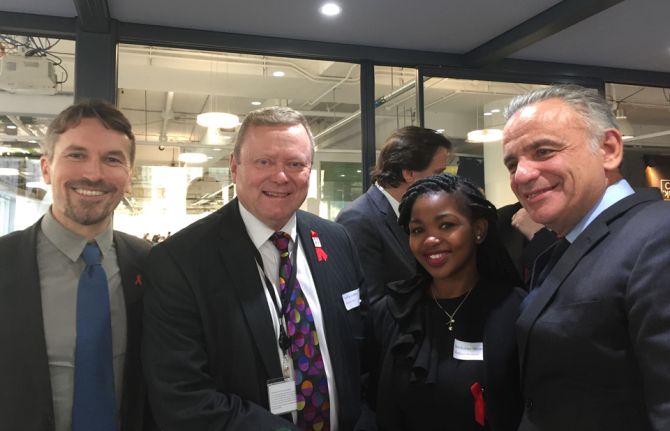
Update
Refuelling the global HIV response: the role of the United Kingdom
30 November 2016
30 November 2016 30 November 2016On the eve of World AIDS Day, STOPAIDS, with support from the United Kingdom All-Party Parliamentary Group on HIV & AIDS, organized an event to discuss the role of the United Kingdom in the global AIDS response.
The participants discussed the role that the leadership of the United Kingdom, one of the largest donors to the international response to HIV, can play in keeping the response on the right trajectory to realize the UNAIDS Fast-Track Targets and ultimately end AIDS as a public health threat by 2030.
Opening the event, Lord Bates, Minister of State at the Department for International Development, took stock of the United Kingdom’s contribution to the global AIDS response to date and the steps the country needs to take to end the AIDS epidemic by 2030.
The participants stressed the need for greater focus and support for key populations at higher risk of HIV infection, ensuring that no one is left behind. Improving access to services for all people, harnessing technology and innovation to scale up and extend services and putting people at the centre by moving towards more integrated services were some of the key areas identified to take the response forward.
UNAIDS emphasized the need for continued political and financial commitment, and stressed that although significant progress has been made in the AIDS response, there is still a financial gap of US$ 6 billion that urgently needs to be addressed.
UNAIDS Deputy Executive Director Luiz Loures, Lord Collins, Shadow International Development Spokesperson in the House of Lords, Anne Aslett, Executive Director of the Elton John AIDS Foundation, and Ndaba Mandela, founder of the Africa Rising Foundation and Mandela Project, were among the participants.
Quotes
“We know what is at stake—we invest our resources now, or we risk facing a resurgence of an epidemic that will take a human societal and financial toll that none of us can possibly bear. It is that simple.”
“We are going to lose the gains we have achieved so far unless we continue to scale up funding and reach people.”
Region/country
Related

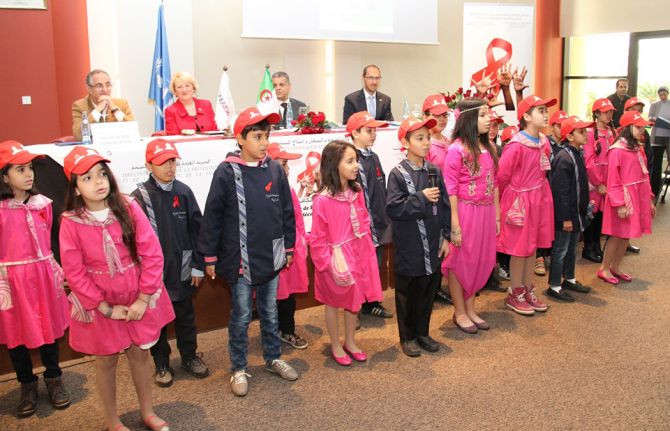
Feature Story
Youth and innovation shine on World AIDS Day in Algeria
01 December 2016
01 December 2016 01 December 2016A dynamic AIDS response characterized by partnership and passion across all sectors, and prioritizing youth and innovation, was celebrated in Algeria on World AIDS Day.
At a lively World AIDS Day commemoration filled with colour and song held in Algiers, key actors in Algeria’s AIDS response came together to reflect on the county’s successes, consider ongoing challenges and emphasize commitment towards ending AIDS by 2030.
Reacting rapidly to the challenges of HIV, Algeria’s response has consistently prioritized cross-sectoral action, community involvement and evidence and innovation within its strategies and policies. Significant results include a sustained low-level epidemic and free provision of antiretroviral therapy for 90% of people living with HIV.
“Algeria has been a pioneer on AIDS in the region, and the response remains highly dynamic. Continued innovation—particularly through harnessing the power of the young, vibrant population—is maximizing gains made and contributing to broader development and rights outcomes,” said UNAIDS Deputy Executive Director Jan Beagle, who welcomed Algeria as a new member of the UNAIDS governing body, the Programme Coordinating Board, from 2017.
To build on the gains made, Ms Beagle noted areas for increased focus, including: access to services for the prevention of mother-to-child transmission of HIV; greater investment in programmes for key populations; and prioritization of women, girls and young people. “Sustained leadership, integration, evidence and rights-based and people-centred approaches that are adaptable at all stages in the life cycle are needed. Let us build on the progress made and continue to be passionate partners in Algeria’s collective efforts,” she said.
Emphasizing commitment to mobilize an accelerated response towards an AIDS-free generation, Ministry of Health Secretary-General Ali Rezgui said, “Young people are this country’s greatest asset. We must treasure them, listen to them and equip them with education, knowledge and tools to prevent HIV and drive forward Algeria’s AIDS movement.”
“Today we celebrate determination, perseverance and progress driven by a highly multisectoral, inclusive response. This model of joint action is critical for the achievement of the interconnected Sustainable Development Goals,” said Eric Overvest, United Nations Resident Coordinator in Algeria.
Commitment to continued collaboration and dynamism was evident through the active participation of young people at the World AIDS Day celebration. “It’s our dream to protect the world against HIV. With solidarity, prevention and knowledge, together we can end AIDS,” a group of schoolchildren sang loudly and clearly.
Region/country

Press Release
UNAIDS and StarTimes join to promote World AIDS Day messages
30 November 2016 30 November 2016StarTimes—the UNAIDS media partner—broadcasts HIV prevention message across African network
GENEVA, 1 December 2016—UNAIDS and media partner StarTimes are working together to reach millions of people with World AIDS Day messages on the theme of HIV prevention. UNAIDS has produced two short videos that promote the life-cycle approach to HIV prevention—finding HIV solutions for everyone, at every stage of life. StarTimes will broadcast the videos across their African networks in English and French from today until the end of the year.
StarTimes is a major digital television operator licensed to broadcast in 30 countries across Africa. No one should be left behind by the AIDS response. Promoting HIV prevention options alongside HIV testing and treatment can ensure that the world will get on the Fast-Track to end the AIDS epidemic as a public health threat by 2030.
The videos can be viewed on UNAIDS YouTube channel at the following links:
UNAIDS
The Joint United Nations Programme on HIV/AIDS (UNAIDS) leads and inspires the world to achieve its shared vision of zero new HIV infections, zero discrimination and zero AIDS-related deaths. UNAIDS unites the efforts of 11 UN organizations—UNHCR, UNICEF, WFP, UNDP, UNFPA, UNODC, UN Women, ILO, UNESCO, WHO and the World Bank—and works closely with global and national partners towards ending the AIDS epidemic by 2030 as part of the Sustainable Development Goals. Learn more at unaids.org and connect with us on Facebook, Twitter, Instagram and YouTube.
StarTimes
StarTimes is the leading digital-TV operator in Africa, serving nearly 10 million subscribers and covering 90% of the continent's population with a massive distribution network of 200 brand halls, 3,000 convenience stores and 5,000 distributors. StarTimes owns a featured content platform, with 440 authorized channels consisting of news, movies, series, sports, entertainment, children's programs, fashion, religion etc. The company's vision is "To enable every African family to afford and enjoy digital TV" StarTimes achieves this by combining satellite and terrestrial DTV systems to provide an open and secure digital wireless platform. The company provides a robust signal transmission service for public and private broadcasters, offers consumers outstanding Pay-TV programs, mobile multimedia, wireless Internet connectivity and convenient online services including checking TV guide; watching free live football; chatting with celebrities and friends.
Contact
UNAIDS GenevaAlasdair Reid
tel. +41 22 791 1352
reida@unaids.org
StarTimes Beijing
Raissa Girondin
tel. +861053012241
raissagi@startimes.com.cn
Press centre
Download the printable version (PDF)

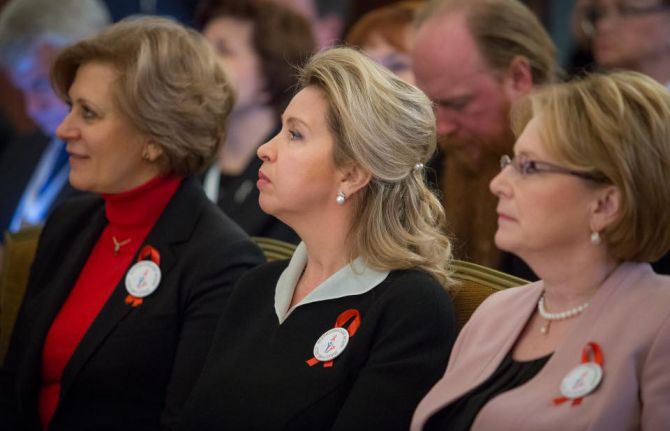
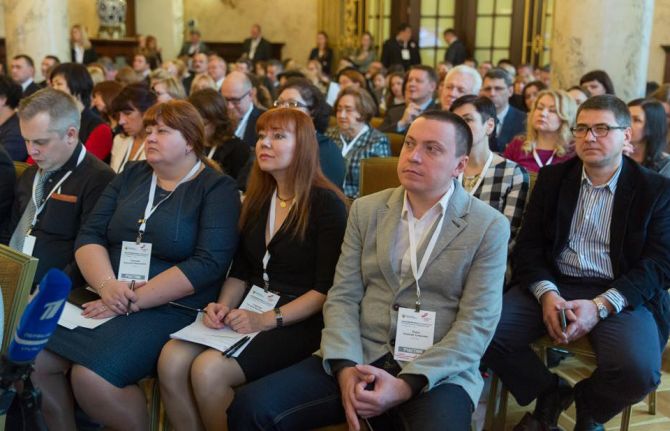
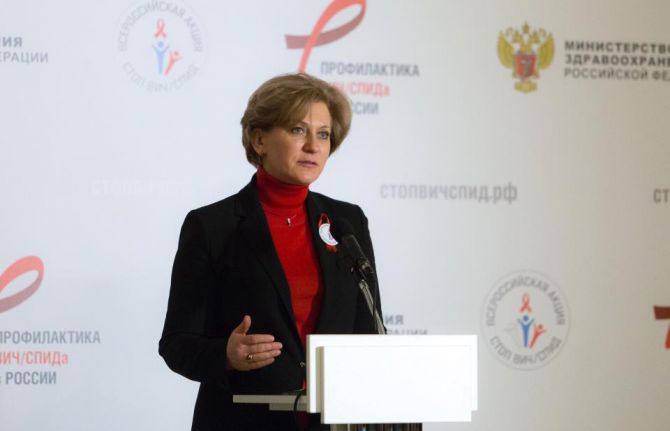
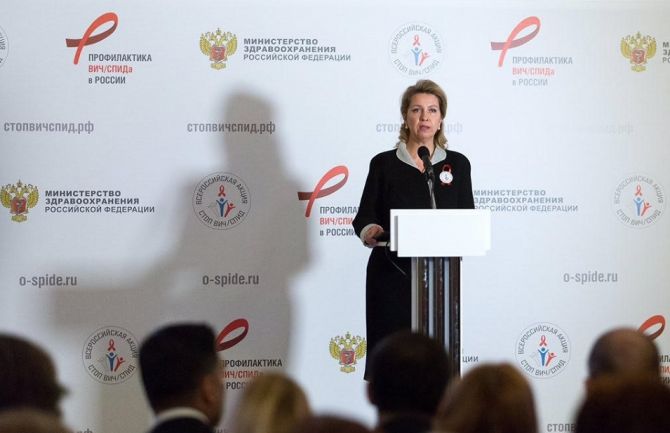
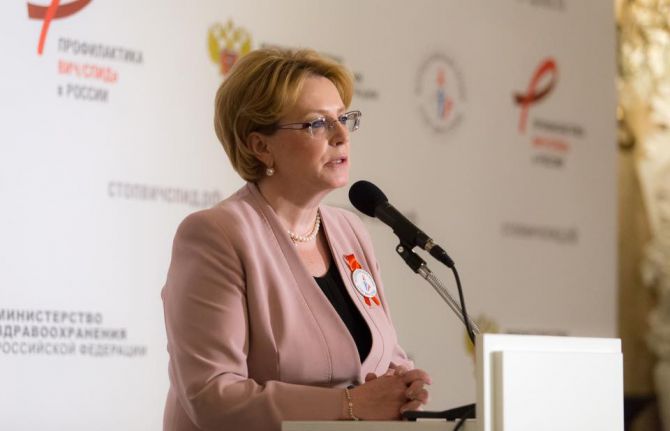
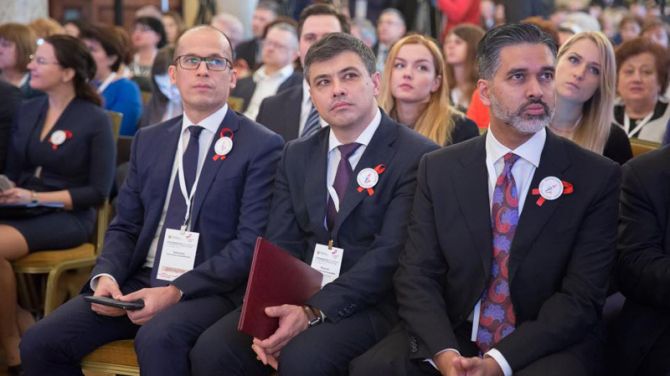
Update
Russian #STOPHIVAIDS HIV prevention campaign launched
29 November 2016
29 November 2016 29 November 2016A national HIV prevention campaign, #STOPHIVAIDS, has been launched in Moscow, Russian Federation, by Svetlana Medvedeva, spouse of the Russian Prime Minister, with the participation of the ministries of health, education and communications and the Russian agency for consumer protection, Rospotrebnadzor.
The campaign was launched at the Second Forum on HIV Prevention and Treatment, organized by the Foundation for Social and Cultural Initiatives and led by Ms Medvedeva and the Russian Ministry of Health. The event united 500 experts and partners from across the Russian Federation to discuss the implementation of the new state strategy on HIV for 2017 to 2020, which was recently approved by the Prime Minister.
Under the slogan #STOPHIVAIDS, the campaign will run on television and social media platforms, featuring Russian celebrities talking about HIV awareness, prevention and stigma and discrimination. The week-long campaign also includes public events, film screenings and free anonymous express HIV testing and counselling. HIV prevention leaflets will be distributed in the six largest railway stations in Moscow and passengers will be invited to be tested for HIV.
The campaign will also feature an online Internet lesson, Knowledge–Responsibility–Health, designed for young people. HIV awareness events are also planned in secondary schools, military bases and juvenile correctional facilities.
The Russian Federation has the largest HIV epidemic in the region, with more than 100 000 new HIV infections reported by the government in 2015. UNAIDS estimates that 1.5 million people were living with HIV in eastern Europe and central Asia in 2015, up from 1 million in 2010.
Quotes
“The main objective of this initiative is to inform people about HIV prevention and diagnosis, as well as to develop responsible behaviour among young people. Particular attention is paid to information for high-school students, military personnel and young people in prison.”
“According to preliminary data for 2016, the number of healthy babies born to HIV-positive mothers has increased by 16% compared with the previous year, exceeding 98.2%. We hope that in the near future our country will end mother-to-child transmission of HIV.”
“We know what to do and our country has all the expertise and tools to stop AIDS. We just need to move forward together, cooperating closely with civil society in reaching key populations at higher risk of HIV infection.”
“We welcome this unprecedented, high-level public mobilization on HIV in the Russian Federation. This approach is fully consistent with the call of the 2016 Political Declaration on Ending AIDS for countries to get on the Fast-Track to end AIDS.”
Multimedia
Region/country
Related

Press Statement
World AIDS Day message 2016
30 November 2016 30 November 20161 December 2016
Michel Sidibé, Executive Director of UNAIDS, Under-Secretary-General of the United Nations
Today, we commemorate World AIDS Day—we stand in solidarity with the 78 million people who have become infected with HIV and remember the 35 million who have died from AIDS-related illnesses since the first cases of HIV were reported.
The world has committed to end the AIDS epidemic by 2030 as part of the Sustainable Development Goals. We are seeing that countries are getting on the Fast-Track—more than 18 million people are on life-saving HIV treatment and country after country is on track to virtually eliminate HIV transmission from mother to child.
We are winning against the AIDS epidemic, but we are not seeing progress everywhere. The number of new HIV infections is not declining among adults, with young women particularly at risk of becoming infected with HIV.
We know that for girls in sub-Saharan Africa, the transition to adulthood is a particularly dangerous time. Young women are facing a triple threat: a high risk of HIV infection, low rates of HIV testing and poor adherence to HIV treatment.
Coinfections of people living with HIV, such as tuberculosis (TB), cervical cancer and hepatitis C, are at risk of putting the 2020 target of fewer than 500 000 AIDS-related deaths out of reach. TB caused about a third of AIDS-related deaths in 2015, while women living with HIV are at four to five times greater risk of developing cervical cancer. Taking AIDS out of isolation remains an imperative if the world is to reach the 2020 target.
With access to treatment, people living with HIV are living longer. Investing in treatment is paying off, but people older than 50 who are living with HIV, including people who are on treatment, are at increased risk of developing age-associated noncommunicable diseases, affecting HIV disease progression.
AIDS is not over, but it can be if we tailor the response to individual needs at particular times in life. Whatever our individual situation may be, we all need access to the tools to protect us from HIV and to access antiretroviral medicines should we need them. A life-cycle approach to HIV that finds solutions for everyone at every stage of life can address the complexities of HIV. Risks and challenges change as people go through life, highlighting the need to adapt HIV prevention and treatment strategies from birth to old age.
The success we have achieved so far gives us hope for the future, but as we look ahead we must remember not to be complacent. We cannot stop now. This is the time to move forward together to ensure that all children start their lives free from HIV, that young people and adults grow up and stay free from HIV and that treatment becomes more accessible so that everyone stays AIDS-free.
UNAIDS
The Joint United Nations Programme on HIV/AIDS (UNAIDS) leads and inspires the world to achieve its shared vision of zero new HIV infections, zero discrimination and zero AIDS-related deaths. UNAIDS unites the efforts of 11 UN organizations—UNHCR, UNICEF, WFP, UNDP, UNFPA, UNODC, UN Women, ILO, UNESCO, WHO and the World Bank—and works closely with global and national partners towards ending the AIDS epidemic by 2030 as part of the Sustainable Development Goals. Learn more at unaids.org and connect with us on Facebook, Twitter, Instagram and YouTube.
Hands up for #HIVprevention — World AIDS Day campaign
Press centre
Download the printable version (PDF)



